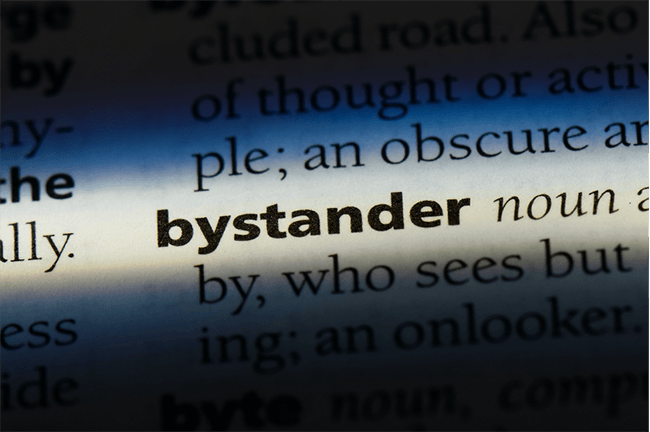
Have you ever witnessed a co-worker treating another co-worker with indecency, perhaps bullying behavior (in-person or online), or seen someone getting yelled at for something you felt was completely uncalled for? Maybe you’ve seen this co-worker get teased, touched inappropriately, or you’ve witnessed the mistreatment on more than one occasion, and you never knew what to do or how to go about helping. You’ve never been a confrontational person, and you’re not about to become one. Is there a way to do something and not get involved? The answer is yes. However, more often than not, this type of scenario manifests a phenomenon known as “diffusion of responsibility;” this occurs when you think someone else will help, and the other witnesses also believe someone else will do something, so no one ends up doing anything at all.
Whether you know the person being bullied and/or the perpetrator, you are what is known as a bystander. I often hear bystanders say, “I don’t want to get bullied or be subjected to retaliation if I get involved.” This is certainly a valid point, but the NIH is committed to addressing this kind of behavior. Imagine yourself in a situation where you are the victim of bullying; wouldn’t you appreciate someone speaking up for you?
Why do bystanders stand by at work? Here are some common possible reasons:
- “I didn’t notice anything.”
- “I wasn’t sure what was happening, and no one else got involved.”
- “I didn’t know what to do.”
- “It wasn’t my place to step in.”
- “I was afraid of retaliation.”
Here’s where you come in, where you get to be an upstander.
You can contact the Office of Equity, Diversity, and Inclusion or the NIH Civil Program and anonymously share what you may consider to be inappropriate conduct/behavior. Both programs have an obligation to address these types of workplace concerns. If you’re unsure which office to contact, know that both offices will take action to address the situation. Check out The Difference Between EDI and the Civil Program to learn more. Your actions may help not only the person you witnessed being bullied, but many other people/incidents that go unseen.
According to www.stopbullying.gov, 80% of bullying occurs in front of an audience or other people, but only 20% do something about it. At the NIH, our bar is set high, and we all want to work in a safe and civil environment where employees are respected, valued, and treated fairly.
Do you have a story idea for us? Do you want to submit a guest blog? If it's about equity, diversity, or inclusion, please submit to edi.stories@nih.gov.
For news, updates, and videos, follow or subscribe to EDI on: Twitter, Instagram, Blog, YouTube.






